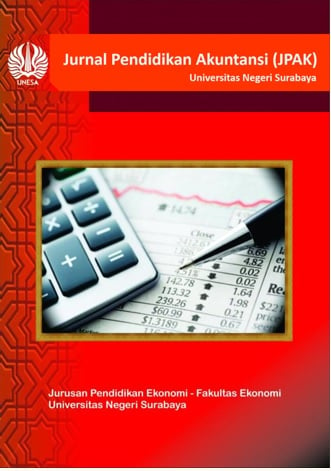Pengembangan Buku Ajar Bidang ilmu Akuntansi Perbankan Kelas XI Semester Genap Berbasis Kontekstual dan Kode Qr di SMK Negeri 1 Lamongan
DOI:
https://doi.org/10.26740/jpak.v11n1.p11-20Keywords:
Accounting, textbooks, contextual, Qr codesAbstract
Vocational High Schools (SMK) play a role in preparing students to become graduates who are able to enter directly into the world of work and continue on to further higher education. Students, at school get knowledge and learning according to the specialization they take. This study aims to analyze the process of developing textbooks, the feasibility of textbooks, and students' responses to the development of contextual-based textbooks and Qr codes in banking accounting class XI banking and microfinance even semester at SMK Negeri 1 Lamongan. This research method is the development of R&D (Research and Development) with a 4-D development model (Define, Design, Develop, Disseminate) which is carried out until the 3rd stage limit. The results of this study state that 1) contextual-based textbooks and Qr codes are suitable for application in banking accounting learning at SMKN 1 Lamongan, 2) based on the validation results of contextual textbooks and Qr codes developed on banking accounting material for class XI SMKN 1 Lamongan are declared feasible , 3) students are very enthusiastic and feel helped by this contextual-based textbook on banking accounting subjects.
Downloads
Downloads
Published
How to Cite
Issue
Section
License
Authors who publish with this journal agree to the following terms:
- Authors retain copyright and grant the journal right of first publication with the work simultaneously licensed under a Creative Commons Attribution License that allows others to share the work with an acknowledgement of the work's authorship and initial publication in this journal.
- Authors are able to enter into separate, additional contractual arrangements for the non-exclusive distribution of the journal's published version of the work (e.g., post it to an institutional repository or publish it in a book), with an acknowledgement of its initial publication in this journal.
- Authors are permitted and encouraged to post their work online (e.g., in institutional repositories or on their website) prior to and during the submission process, as it can lead to productive exchanges, as well as earlier and greater citation of published work (See The Effect of Open Access).

Jurnal Pendidikan Akuntansi (JPAK) is licensed under a Creative Commons Attribution-NonCommercial 4.0 International License.
 Abstract views: 321
,
Abstract views: 321
, PDF Downloads: 358
PDF Downloads: 358



